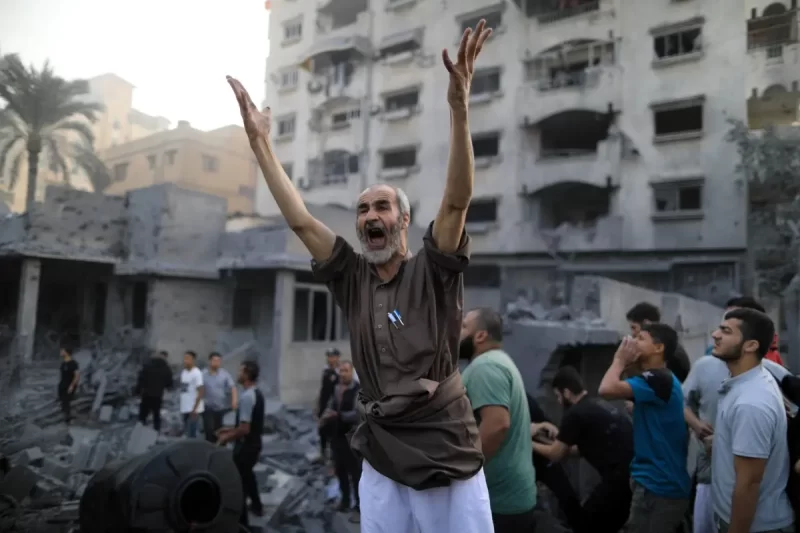Global Issues
The Israel-Palestine Conflict and The Essentiality of Neutrality -By Abhulimen Jonathan
In the face of these challenges, it’s essential to remember that war is never a good thing, and bloodshed should never be endorsed. The imperative here is not neutrality; it’s about our shared humanity. Amidst the complexity of this conflict, there are those who yearn for social harmony and peaceful coexistence, rather than perpetuating rifts, rancor, violence, and bloodshed.

In the heart of one of the world’s longest-running conflicts, where war, violence, and bloodshed have become all too familiar, the need for neutrality has never been greater. The Israeli-Palestinian conflict is a complex web of historical grievances, territorial disputes, and a tragic cycle of violence. However, supporting war and violence should never be seen as a path to resolution and is never and will never be a good thing. The world watches as Christians and Jews rally behind Israel’s persistent attacks, while Muslims express solidarity for Palestine and supported Hamas’ offensive on October 7, 2023. Social media posts provided clear evidence of these sentiments, but we must remember that extremism on either side doesn’t lead to a just peace. It’s a situation that demands a nuanced approach, one that transcends religious and ideological boundaries.
Amidst this chaos, it’s crucial to emphasise that people have become more emotional than rational about the issue. The enormity of the conflict often clouds our judgment, making it difficult to objectively analyze the situation. At its core, the Israeli-Palestinian conflict is about territorial integrity. Regrettably, this issue has been misinterpreted in many parts of the world. It has become intertwined with personal beliefs and ideologies, which is a distortion of its true nature. People are supposed to condemn the atrocities that have occurred and are currently ongoing. War, violence, and bloodshed should never be normalized.
The atrocities committed during this conflict are undeniable, and they should be unequivocally condemned. There is great suffering, and to claim that neutrality is a crime when the Palestinians are enduring a genocide is an oversimplification. However, it’s essential to note that the reactions to the conflict have been far from consistent and also, to recognize that emotions can lead to polarised views. For instance, we’ve seen people rejoicing for Palestine when Hamas launched the first attack on October 7, only for later claims to surface that the attack was a plot by the West in collaboration with the Israeli Forces.
The safety and well-being of both Palestinians and Israelis should be of paramount concern. While both sides have endured suffering, the portrayal of the conflict often misrepresents the reality. People are supposed to condemn the atrocities that have occurred and are currently ongoing without exception. War, violence, and bloodshed should never be normalized. This is not about choosing sides; it’s about recognizing our shared humanity.
The portrayal of the conflict in the Western media adds to the complexity of the issue and this should not be overlooked. Misrepresentations are rampant, as seen in the case of BBC’s coverage of the events at Al-Aqsa mosque on October 10, 2023. The invasion was described as a “clash”, obscuring the reality of the situation. This demonstrates the need for balanced reporting. Israel is often presented as a judicious actor making rational and mature decisions, while Palestinians are portrayed as unruly children with unintelligible urges. This portrayal implies hostility towards Jews rather than a resistance to Israeli occupation, which is an oversimplification of the complex dynamics at play.
The Western media’s framing attempts is to justify Israeli actions while demonizing Palestinian resistance. These biased narratives only deepen the divide and hinder any prospects for a peaceful resolution. Millions of Palestinians have been displaced from their homes, a tragic consequence of the ongoing conflict. Despite this, Israel continues to be portrayed in favourable light. However, it’s equally vital to scrutinize the actions of all parties involved. Painting any side as entirely good or bad is an oversimplification that obstructs the quest for lasting peace.
In the face of these challenges, it’s essential to remember that war is never a good thing, and bloodshed should never be endorsed. The imperative here is not neutrality; it’s about our shared humanity. Amidst the complexity of this conflict, there are those who yearn for social harmony and peaceful coexistence, rather than perpetuating rifts, rancor, violence, and bloodshed.
The Israeli-Palestinian conflict is a tragic reminder of the devastating consequences of war and violence. It calls for a re-evaluation of our perspectives and the recognition that neutrality is not a crime; a stance that allows us to step back from the heated emotions and ideological fervor that cloud our judgment. It inches closer to a peaceful resolution. Our shared humanity, the pursuit of peace, and the condemnation of bloodshed should guide our actions and responses in these trying times.


















